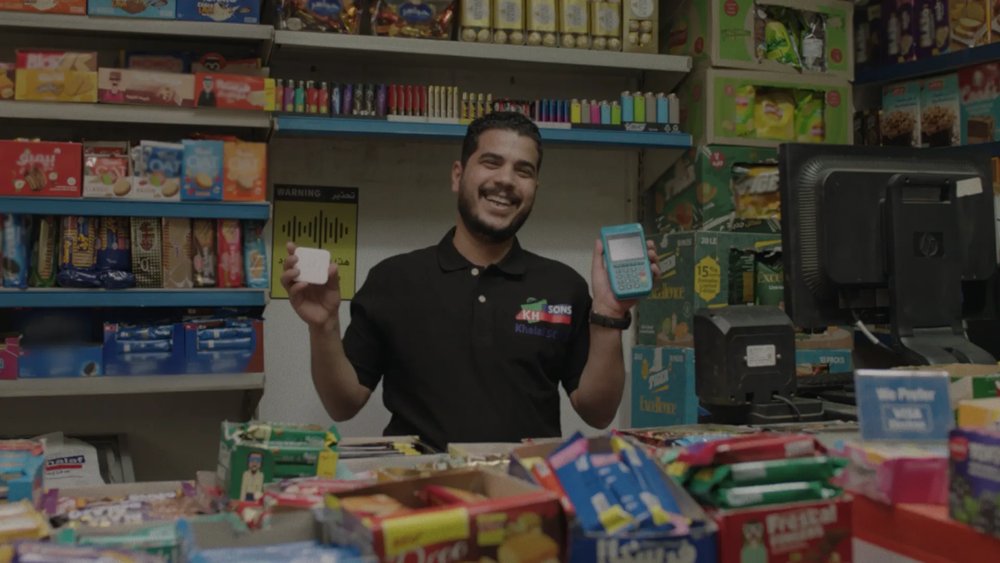Campaign of the Week
Visa turns common phrase into ad campaign funding for Egypt’s local merchants /
Payment company Visa launches an AI-powered device to reward small businesses each time the word ‘Visa’ is mentioned at checkout
In Egypt, people commonly refer to any payment card as ‘Visa’. The metonymy is so widely accepted that transactions in small shops usually conclude by the merchant asking ‘Cash Walla Visa?’ (Cash or Visa?). It’s great for the brand, and now the payments provider is putting some media spend to bolster this ‘free’ advertising.
Visa gave owners of small businesses (ranging from barbers to grocers) an AI-powered voice-activated device that detects every mention of ‘Visa’ and rewards them with a sponsored ads on social platforms like TikTok and Instagram.
With Walla Visa?, the brand provides small entrepreneurs who don’t have the marketing budgets of huge brands with resources to unlock new growth.
‘At Visa, we see small businesses as the heart of economies, and we are committed to their success,’ said Hussein Kandil, senior marketing director MENA and south Asia, Visa, in a statement. ‘These merchants have supported Visa for years through a simple, organic phrase. With Walla Visa, we’re turning that everyday expression into a real opportunity for growth.’
The campaign launched in April 2025 was made in partnership with Saatchi & Saatchi MEA, Dubai.

Results Updated 8/5/2025: According to the agency, the campaign delivered a 4.2% increase in brand recall and a brand preference 48.2% higher than competitors while the campaign lasted. Over 366,000 people engaged within the first two weeks.
Contagious Insight /
Going local / Local relevance begins with listening. The challenge for global brands is clear: how do you remain consistent at scale while staying sensitive to local idioms, habits and behaviours?
Walla Visa is a great example of a campaign powered by a local insight – the way local merchants use ‘Visa’ interchangeably for any payment by card. Visa puts this insight to great use, giving marketing visibility to local merchants, making it a helpful business partner and a go-to payment provider for small local businesses who hold an important space in Egyptian society.
'Small businesses make up 90% of Egypt’s private sector and contribute around 43% to the GDP,’ Fizo Younis, chief creative officer at Publicis Communications Saudi Arabia and Egypt told Contagious. ‘But it’s not just about scale, it’s about momentum. These are the businesses creating jobs, solving real problems. In today’s economy, they’re not just important, they’re essential. Visa champions progress, and in Egypt, this is where progress lives.'
By embracing how people already use ‘Visa’ in their vocabulary, the brand also reinforces its ubiquity, turning passive association into active engagement.
Human AI / Visa doesn’t use AI for abstract innovation, it applies it in a human, community-focused way that gives back to small businesses. AI is everywhere – adland is no exception. But what happens when everyone tries to apply a shiny new tech to their comms is often gimmicky, and sometimes straight out damaging (look no further than Google’s Dear Sydney Olympics ad that annoyed people for suggesting using AI to write a fan letter).
Rather than deploying artificial intelligence as a novelty, Visa applies it in a simple, effective way – rewarding authentic interactions rather than manufacturing them. In doing so, it shows how brands can leverage the tech to quietly empower people and enhance everyday experiences.
‘We didn’t start with AI. We started with the idea. And the idea needed a trigger. That’s where AI came in,’ said Fizo Younis. ‘That’s it. No hype. No over-engineering. Just a clean, almost invisible layer of tech that makes the idea possible.’
Want more of the same? /
We don’t just write about best-in-class campaigns, interviews and trends. Our Members also receive access to briefings, online training, webinars, live events and much more.







